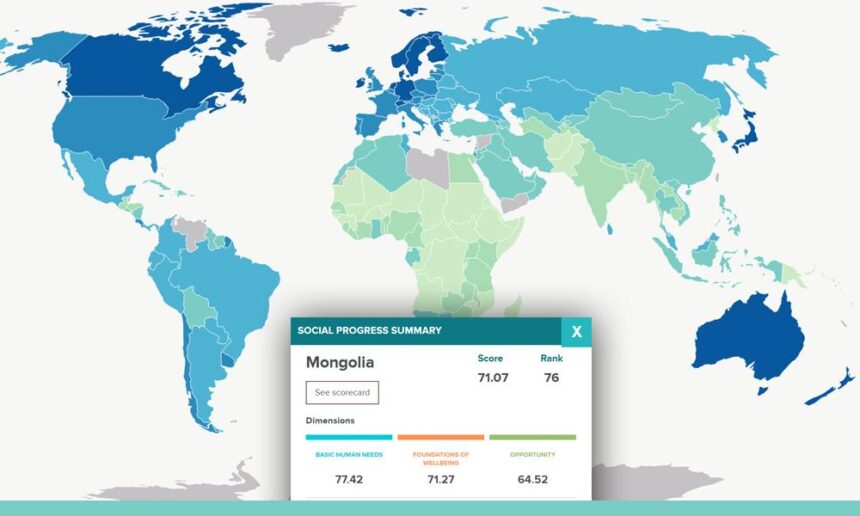Mongolians have emphasized economic growth, particularly the GDP (Gross Domestic Product) increase in measuring the country’s development ever since the democratic revolution took place. During the last thirty years, the economic growth was at 5.45% on average. In 2011, it even soared to 17%, which was one of the highest rates globally. Why is one-third of the population still impoverished despite the economic growth? Does economic growth matter in the absence of inclusivity?
For many years, reputable scholars such as Amartya Sen, Douglass North, and Joseph Stiglitz have been proposing the concept of measuring a country’s development with its social progress rather than merely measuring economic performance. This idea has been implemented by the NGO “Social Progress Imperative” led by Michael Porter, a professor at Harvard. The first report ranking “Social Progress Index (SPI)” of 133 countries was published in 2014. This SPI report assesses the extent to which countries provide for the social and environmental needs of their citizens using 50 indicators. These indicators are divided into three main dimensions: basic human needs, foundations of wellbeing, and opportunity to progress.

Social wellbeing is measured by social and environmental rather than economic factors. The SPI does not use economic input, and it evaluates using output rather than input. This enables governments, businesses, and civil society to measure the social consequences of a country’s economic progress, and to prioritize different pillars of economic and social development policies accordingly. When assessing the SPI, each country’s regular reports by internationally-specialized and professional organizations such as the UN and World Bank, as well as information provided by the press, are taken into account.
Basic Needs
The SPI report divides the basic human needs dimension into four components based on A. Maslow’s theory.
- Nutrition and basic medical care (undernourishment, maternal and child mortality rate, child stunting, and deaths from infectious diseases)
- Water and sanitation (deaths attributable to unsafe water, sanitation, and hygiene; populations using unsafe or unimproved water sources; and percentage of populations using unsafe or unimproved sanitation such as pit latrines)
- Shelter (access to electricity, deaths attributable to household air pollution, and usage of clean fuels and technology for cooking)
- Personal safety (homicide rate, perceived criminality, political killings and torture, and traffic deaths)
In the 2020 report, Mongolia ranked 102nd out of 180 countries by meeting its citizens’ basic needs with 77.42%. The best and the worst rankings were in the indicators of perceived criminality – low (8th) and undernourishment – high (134th).
Foundations of Wellbeing
This dimension also has four broad components.
- Access to knowledge (women without schooling, primary school enrollment, secondary school attainment, gender parity in secondary attainment, and access to quality education)
- Access to information and communications (mobile telephone subscriptions, internet users, access to online governance, and media censorship)
- Health and wellness (life expectancy at age sixty, premature deaths from non-communicable diseases, access to essential services, and access to quality healthcare)
- Environmental quality (deaths attributable to outdoor air pollution, greenhouse gas emissions, particulate matter, and biome protection)
In the 2020 report, Mongolia ranked 87th by meeting the wellbeing needs with 71.27%. Mobile telephone usage to the population ratio was the highest globally (1st), while the number of deaths from non-communicable diseases was high (173rd).
Opportunity
The dimension of opportunity to progress is also divided into four components.
- Personal rights (political rights, freedom of expression, freedom of religion, access to justice, and property rights for women)
- Personal freedom and choice (vulnerable employment, early marriage, satisfied demand for contraception, and corruption)
- Inclusiveness (acceptance of gays and lesbians, discrimination and violence against minorities, equality of political power by gender, equality of political power by socioeconomic position, and equality of political power by social group)
- Access to advanced education (Expected years of tertiary education, women with advanced education, quality weighted universities, and citable documents)
In the 2020 report, Mongolia ranked 52nd by meeting its citizens’ needs to thrive with 64.52%. Violence against minorities was low (16th). However, the indicator of women with advanced education ranked Mongolia 131st.

The report above highlights that the time has come to measure prosperity by social progress rather than depending entirely on the GDP growth. Therefore, social progress needs to become the utmost priority for leaders in the government, businesses, and civil society. Social Progress Index will be a crucial factor in measuring the fulfillment of Sustainable Development Goals (SDG) of a given country.
Although social progress does not automatically grant economic prosperity, an increase in the citizens’ income indeed leads to improvements in the access to freshwater, sanitation, literacy, and basic education.
2021.01.13
Trans. by Riya.T and Munkh-Erdene.D












